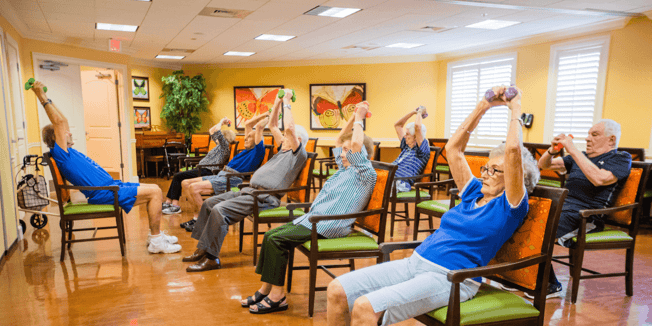Discover the most trusted Memory Care facilities with experienced caregivers.
Discover the most trusted Memory Care facilities with experienced caregivers.
Blog Article
Assisted Living: a Compassionate Setting for Seniors With Memory Obstacles
By giving customized care and structured routines, these communities not only enhance cognitive function yet also foster psychological links, lowering isolation amongst homeowners. The efficiency of these interventions typically pivots on the involvement of households in the care process, triggering a better evaluation of just how this collaborative initiative affects end results for both homeowners and loved ones.
Recognizing Memory Difficulties
Recognizing memory obstacles is vital for offering effective care to elders facing cognitive decline. Memory impairments, which can materialize as forgetfulness, complication, or trouble recalling recent occasions, are typically signs and symptoms of conditions such as Alzheimer's illness or various other forms of mental deterioration. These obstacles can significantly affect an elderly's capability to carry out day-to-day jobs, preserve social relationships, and handle personal security.
Recognizing the different stages of cognitive decline is vital for caregivers and health care professionals. Early-stage amnesia might include moderate lapse of memory, while mid-stage decline can result in much more pronounced disorientation and confusion. In late-stage mental deterioration, people may shed the ability to interact efficiently, needing comprehensive support and understanding from caretakers.
Additionally, memory obstacles can evoke a variety of emotional actions, consisting of stress, anxiousness, and clinical depression. This requires a caring method to care that prioritizes the psychological wellness of the person. Comprehending the intricacies of memory difficulties allows caregivers to produce customized approaches that boost communication, promote engagement, and provide a sense of safety and security. Inevitably, a deep understanding of these challenges is basic to providing thoughtful and reliable care for elders encountering cognitive decline.
Benefits of Assisted Living
Helped living deals many benefits for seniors with memory difficulties, providing a helpful environment that fosters self-reliance while ensuring safety and treatment. Among the key benefits is the day-and-night supervision and help offered, which helps mitigate threats related to memory-related problems. Memory Care. This continuous assistance allows elders to involve in day-to-day tasks without the anxiety of accidents or confusion
In addition, assisted living facilities often give organized regimens that can boost cognitive feature and security. These regimens help locals really feel even more safe and secure and lower anxiousness, as they recognize what to anticipate each day. Social interaction is one more significant benefit, as these atmospheres motivate connections among residents, advertising psychological well-being and decreasing sensations of isolation.
Additionally, assisted living staff are trained to recognize the special needs of elders with memory challenges, enabling individualized treatment plans that deal with private choices and demands. This tailored strategy not only improves the top quality of care but likewise equips elders to preserve a feeling of autonomy. Overall, assisted living offers as a compassionate solution, stabilizing the requirement for assistance with the desire for independence in the lives of elders facing memory difficulties.
Specialized Treatment Approaches
Carrying out specialized care strategies is crucial for successfully supporting seniors with memory challenges. One fundamental technique is person-centered care, which highlights the importance of understanding each local's life background, preferences, and worths.
One more important approach entails making use of cognitive stimulation therapies. Activities designed to improve memory recall, urge social communication, and promote psychological dexterity can considerably affect residents' general wellness. Techniques such as reminiscence treatment take advantage of individual memories to trigger conversation and connection, while music treatment can stimulate emotions and memories, giving convenience.

Creating an Encouraging Community
(Dementia Care Charlotte)A supportive neighborhood plays an essential function in boosting the lives of elders with memory obstacles. Such an area fosters an atmosphere of understanding, concern, and encouragement, which is essential for individuals encountering cognitive problems. By developing a network of assistance, aided living centers can substantially boost the top quality of life for citizens.
Central to an encouraging area is the existence of experienced personnel who are delicate to the one-of-a-kind demands of seniors with memory problems. These experts not only give important treatment but likewise engage citizens in meaningful activities that stimulate cognitive function and advertise social communication. Programs that motivate participation in team workouts, arts and crafts, or memory video games can boost both physical and mental health.
Furthermore, a helpful neighborhood promotes strong connections among locals. Encouraging relationships and peer support aids to decrease feelings of seclusion and cultivates a feeling of belonging. Routine get-togethers and common dining experiences can further reinforce these bonds, creating an ambience where seniors feel valued and recognized.
Involving Family Members in Care
Engaging family members in the care process is necessary for providing extensive support to senior citizens with memory obstacles. Relative typically serve as vital supporters, using understandings right into the person's choices, history, and routines that can boost customized care. By including them in discussions and treatment preparation, assisted living facilities can develop a much more all natural approach that resonates with the resident's needs.

Motivating families to join care not only improves the health of the elderly however additionally offers psychological support to relative. Involving families in treatment cultivates a sense of area and belonging, ensuring that elders feel linked to their liked ones. Ultimately, a collective technique to care enriches the lives of both homeowners and their family members, creating a compassionate and supportive atmosphere that promotes self-respect and respect.
Verdict
In final thought, assisted living acts as a vital source for senior citizens experiencing memory difficulties, providing customized treatment customized to individual demands. The organized routines and appealing tasks advertise cognitive feature and emotional health, fostering a sense of belonging. Specialized care methods, such as reminiscence and music therapy, improve interaction and connection. By entailing households in the care process, visit the site aided living develops a detailed support network, inevitably improving the lives of residents and their loved ones.
Report this page